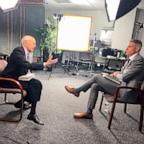Ford Posts $2.1 Billion In First Quarter Profits
American automaker makes a dramatic comeback.
April 27, 2010— -- Ford is back. Today, the American automaker reported first quarter profits of $2.1 billion, a dramatic turnaround from where they were a year ago.
It seems the company has finally convinced more consumers that Fords are better than Japanese cars.
Katherine Boho traded in her Lexus for a Ford Edge.
"I love the idea this is an American-made car and it gave people in my country jobs," she said.
So how did Ford change its cars and its business?
Ironically, CEO Alan Mulally used Toyota as his model as he turned Ford Motor Company around.
"Every vehicle would be best in class in terms of quality, fuel-efficiency, safety, smart design and the very best value," he said.
To get there, Ford went back to the drawing board, designing sturdier, safer cars. It added more testing to each step of the assembly line. And marketed the changes relentlessly.
"The most important decisions that we made...was one, to focus on the Ford brand, and that meant we divested all the other brands," said Mulally.
"The second thing was we decided that we were going to have a complete family of vehicles – small, medium, and large…cars, utilities, and trucks.
"And the third thing was that every vehicle would be best in class in terms of quality, fuel efficiency, safety, smart design, and the very best value and we were going to utilize all of our resources intellectually around the world. And the results that you see today…are a result of making those decisions very decisively three years ago."
Consumer Reports now finds ninety percent of Fords are "average" or better in reliability. That's up dramatically from three years ago.
In crash tests, Ford models now share top safety ratings. Its Fusion sedan was named the Motor Trend 2010 Car of the Year.
American consumers are finally taking notice, and not just of Ford, giving U.S. automakers new respect for the first time in years.
According to a survey by the Associated Press, sixty-eight percent of respondents would consider buying an American car today as opposed to sixty-four percent in 2006.




